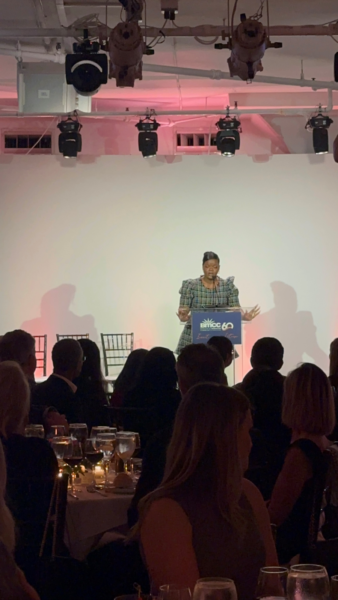Breaking Barriers Beyond The Label of Felon

Namyanka is graduating in May 2024 with an associate’s degree in nonprofit management. She was inspired to pursue that degree after her experience with nonprofits in reentry.
In the fall semester of 2023, I found myself standing before an audience at a Gala, sharing the unexpected journey of my life post-prison. The honor bestowed upon me was unimaginable, yet there I stood, a proud mother and college graduate, dismantling barriers and challenging stereotypes. Throughout my journey, I found solace and support in various programs, particularly through the guidance of a mentor—a fellow formerly incarcerated woman—who tirelessly advocated for individuals like us. Reconnecting with her through a non-profit organization led me to BMCC, a symbol of opportunity and growth.
However, recent events have shed light on the ongoing challenges faced by individuals with convictions on-campus. In a distressing meeting, I encountered verbal and physical attacks from another student, met with incompetence from program directors ill-equipped to handle such situations.
Despite my plea for support, I was advised against filing a report with public safety, and even urged to work remotely, leaving me feeling defenseless and stripped of dignity.
The realization that my past conviction is perceived as a life sentence—a perpetual obstacle to my dreams—is disheartening. It prompts the question: What if we entrusted experienced individuals, regardless of past convictions, to lead organizations dedicated to empowerment?
What if we saw people for who they are now, not who they once were?
It is time to move beyond labels and embrace the potential within each individual, irrespective of their past. It is time to challenge discrimination and advocate for change. As a matter of fact, BMCC does not tolerate discrimination, and it is imperative that we hold true to this principle.
I am deeply hurt by the hypocrisy of being lauded as a model of the program’s success while being left vulnerable to the possibility of returning to jail. If another student followed through on threats, the mere allegation that I did something wrong is enough for the police to disrupt my life and return me to confinement, pending the outcome of an investigation. I don’t think people on campus understand that risk. I feel as though the program failed to protect me, and it is essential that we address this systemic issue and ensure the safety and well-being of all individuals, regardless of their past mistakes.
We can break down barriers and build a future where everyone has the opportunity to thrive, where people’s achievements can be celebrated without fear, and where our contributions count more than past mistakes.
Editor’s Note: Many essays from returned citizens reveal a sense of isolation and solitude within the academic environment. The essay featured in this issue is notable because it explores the significant risks associated with being identified as someone with a conviction on campus. The college discussed is notably progressive, offering a dedicated space for students who have experienced the criminal legal system. This initiative places it ahead of many institutions, especially in an era where programs like Second Chance Pell spotlight the necessity for safe, inclusive spaces on campuses nationwide. Inclusivity not only enriches campus life for all students but also emphasizes that community support is as crucial as academic achievement. This essay spotlights the need for ongoing development of campus cultures where every student has the opportunity to thrive.